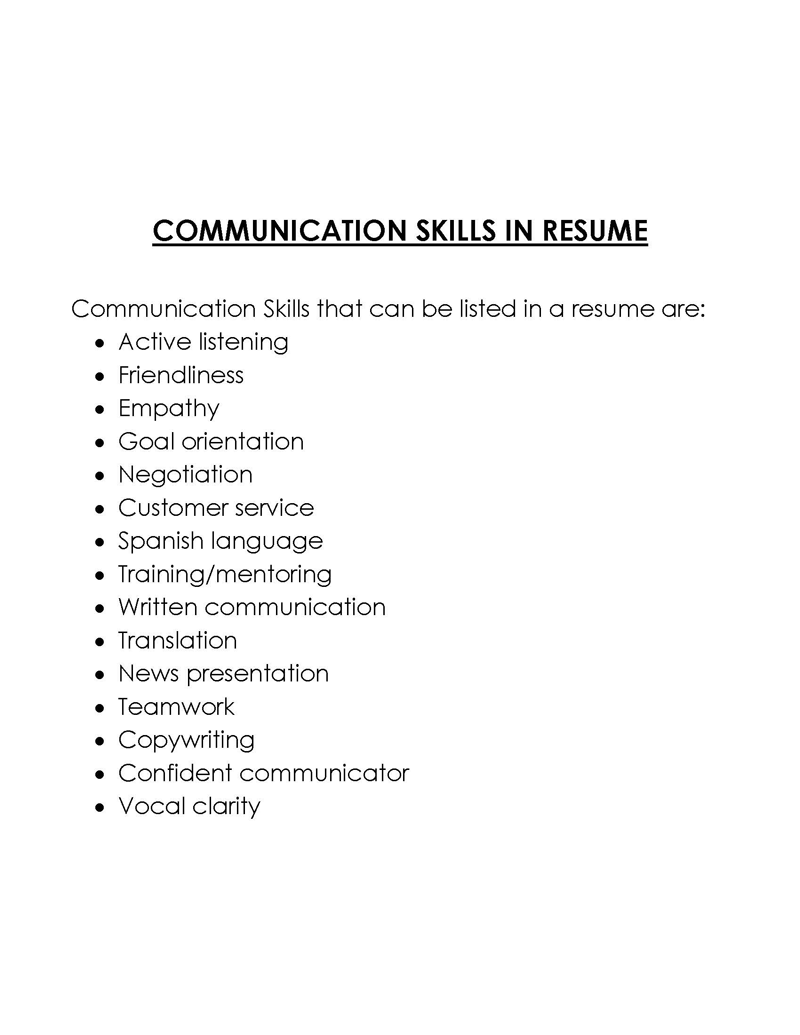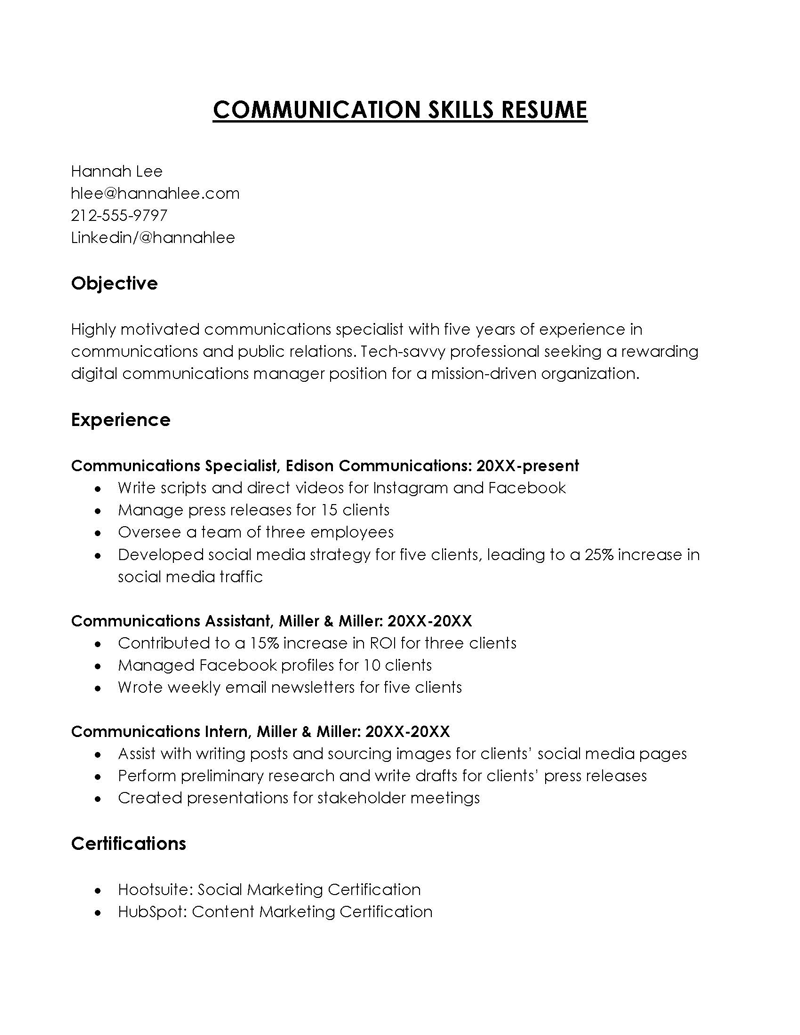Communication skills can be essential in many different career opportunities. Employers want to work with someone who knows how to listen and talk with those around them. This isn’t just with the customers and clients; it is also with other coworkers and with managers and higher-ups within the community.
In this article, we will take the time to discuss why communication skills are so essential to put on your resume. Some of the topics this article will cover include:
- What are communication skills, and why are they so important?
- The different types of communication skills, including verbal, nonverbal, and interpersonal
- Examples of the best communication skills to add to a resume.
- Where to place your skills on your resume to make the most significant impact
- Tips to ensure your skills help you get that job.
What are Communication Skills
For many careers you would like to pursue, communication will be essential. You need to communicate with the customers and clients, with other employees in the position, and even with managers and CEOs to ensure the work gets done. Without practical communication skills, you will end up making a mess of things and will not be the fit the hiring manager is looking for.
When writing a resume to impress a future employer, you need to ensure your impressive communication skills are on display as much as possible. This will help put you above the competition for that position and makes it more likely that you will land the role you would like.
There are different communication skills that you can pick from for your resume. Some of these include:
- Honesty
- Empathy
- Motivation
- Accepting or giving feedback
- Team building
- Negotiating
- Active listening
- Presenting
- Speaking
- Writing
- Confidence
- Positive body language
- Clear articulation
Types of Communication Skills
There are different types of communication skills that you can employ and which need to be shown on your resume to show that your skills will meet with what the employer is looking for. You will need a good range of verbal, nonverbal, and interpersonal skills to include in your resume to show how adapted you are to the open position.
Some of the best skills to consider include:
Verbal communication skills
These are the words you say to others and the tone you use to portray your information. Utilizing a professional tone at the right time will make a difference and help the client, employee, or someone else understand your point clearly and concisely.
Some examples of these skills include:
- Persuasion
- Debating skills
- Storytelling
- Convincing
- Conflict management
- Confidence
- Concision skills
- Assertive
- Articulate
- Sense of humor
- Public speaking skills
- Presentation skills
Nonverbal communication skills
Nonverbal skills allow us to use our facial expressions, body movements, and even tone of voice to help portray our message. For example, someone may tell you that they are excited about a big event, but if they are reclined, rolling their eyes, and sound bored, you may not believe them due to their nonverbal skills.
Some examples of these include:
- Hand gestures
- Facial expressions
- Eye movements
- Tone of voice
Written communication skills
Those skills which are used to write something are called written skills. These skills are also necessary and add a plus point to your resume because writing is essential to any job. You may be required to write any professional document or anything else. This is where your written skills will play their part.
Some of the written communication skills you include in your resume are as follows:
- Business writing
- Creative writing
- Pitch deck writing
- Proofreading
- Presentation writing
- Legal writing
- Emails
- Press releases
- Report writing
- Summarizing
- Technical writing
- Financial report writing
- Editing
- Content writing
- Blogging
- Playwriting
Interpersonal communication skills
As you take on an official position or another professional career, you must also work on your interpersonal communication skills. These are the skills that allow you to work effectively with other people. You may find they include tasks like flexibility, empathy, and adaptability in the workspace. Your future employer wants to see that you will work well with others, your coworkers, and any clients and customers before they hire you for any position.
Some examples of these skills include:
- Adaptability
- Courtesy
- Creative thinking
- Empathy
- Friendliness
- Honesty
- Improvisation
- Leadership
- Listening
- Mediation skills
- Mediation
- Logical thinking
- Psychology
- Respect
- Social skills
- Teaching and coaching
- Team building
- Negotiating
- Versatility
- Utilizing non-verbal cues
- Teamwork
How to Show Communication Skills in a Resume?
Showing off your communication skills on a resume may take a bit of practice and may prove challenging as you get things done. Of course, you want the potential employer to know that you can communicate well, but taking up too much of the resume just with skills can cut out all the other cool skills and experience you need to discuss.
The good news is that you can show different skills in various sections of your resume, saving space and still helping you to show off.
Some of the sections where you can show these skills in a resume include:
Take advantage of a summary section
As a professional with three or more years of experience, you can add a resume summary to the top of your resume. This short blurb at the top of the resume is meant to take all relevant years of experience and turn it into a highlight reel that the recruiter can read through in a few minutes. This makes it the perfect place for you to add unique skills like communication.
You want to keep the summary section down to two or three lines, which can seem tight for all that great experience you have gained over the years. But adding in at least a few skills can make a big difference in whether the hiring manager will take a look at your resume. So make it your goal to put at least two or three communication skills in your resume summary.
EXAMPLE
Self-motivated and efficient retail professional with 6+ years of experience working in various levels of retail and department stores. Started as a professional sales representative and worked to provide recommendations that best served the customers and provided solutions when problems arose. I built strong relationships in my leadership and management roles through open communication, teamwork, and adaptability.
Use the work experience section well
Your work experience section is a great place to list some of your communication skills. As you list your previous work experience, think about how you communicated with past coworkers and customers and describe how you handled difficult situations with excellent skills.
The work experience section includes skills like conflict resolution, answering questions, or handling scheduling conflicts for your employees. Write about these in your resume to show you know how to communicate professionally.
EXAMPLE
- Used creative solutions to handle conflicts between coworkers and different team members, bringing in non-verbal cues to help understand the problem and develop an appropriate solution for all parties.
- Recognized for leadership abilities that adapted and helped handle client objections, making the proper recommendations, and assisting others on the team as needed.
- Drafted and sent department emails to update employees on changes to procedures, important meetings, and other necessary information.
Utilize the education section to show your communication skills
Even the education section on your resume can be used to show off your skills. Think about the different ways you communicated with others during your years in college, and then highlight those skills for the recruiter. Maybe you were the captain of the German club. Writing that on the resume shows that you held a leadership role that put you in front of many different students and required several organizational skills to help get the work done.
You can do this with many of the different extracurriculars you join or even classes you take. Show your roles and how you communicated with faculty, students, and professionals in your industry to show that you can handle many forms of communication.
EXAMPLE
BA in Business Administration
University of Ohio
2018-2021
Extracurricular activities: President of the Debate team (2019 and 2020), Secretary of Student Council (2021).
Create an impressive skills section
While it is possible to add communication skills to the other portions of your resume, it can be difficult when you have limited work experience. Therefore, another section where you can place your communication skills is in the skills section of the resume.
This section is crucial because it will help to highlight and list out all of the skills that you currently have that match up with what the job is looking for. This section is often between the professional experience section and the resume summary.
You can feel free to add some of the skills you think will lend you well to the open position, but try not to waste too much space on the skills so you have room for the other parts of the resume. Most experts agree that 12 to 15 skills are a good number to aim for. Don’t list out random skills here. This is your spot to shine, so write out essential skills that are met to impress the hiring manager.
To help you create an impressive skills section, make sure that this section is visible and accessible for the recruiter to find. Try to match the skills with the job description. This helps the recruiter notice you faster and makes you seem a better fit for the open position. If possible, try to add percentages and numbers to your skills to make them as specific as possible. As you fill out this section, think about what the employer is looking for in communication skills, and then try to include those in the resume skills section.
EXAMPLE
- Used courteous behavior when listening to other coworkers to handle conflicts and disputes.
- Adapted leadership skills to handle different communication and personality styles to bring team members together.
- Worked as part of a team to devise practical solutions to problems on the worksite.
Free Templates
Given below are communication skills in resume templates:


Tips to Consider When Including Communication Skills in a Resume
As you are writing your resume, you want to ensure that you can add the relevant communication skills to impress the recruiter and get them to look at your skills rather than someone else.
Some of the tips that you can follow when choosing to include your skills on a resume include:
Choose the right medium
It is not only essential to communicate effectively through your words but also to use a suitable medium. You wouldn’t break some terrible news to someone through text message, and you wouldn’t show off your skills at the wrong time either.
For example, there are things that you should say in person to the other person, and others may need more documentation. It may even depend on the person you will talk to. Consider situations where you choose a suitable medium to communicate with another person at work and then explain how it was the right decision for the situation.
Be concise
As you work on the resume, your goal is to concisely provide all the relevant information the hiring manager will need. Include the relevant and most important details to this job posting while kicking out the generic information and anything that doesn’t add value to the resume. Therefore, make yours concise and impressive from the beginning, making it more likely to stand out from the crowd.
Include relevant keywords
The right keywords peppered into the resume will make it more likely that the hiring manager will choose to interview you rather than some of the other qualified candidates. But which keywords should you consider adding to the resume? Again, the job description will be an excellent place to look for some of those keywords.
Take some time to go through that original job description again and look for the specific keywords that the hiring manager is asking for. If a keyword appears more than once in the job description, it is likely an essential skill for the hiring manager. Then, find ways to implement those into the resume to make you stand out from the other candidates.
Prove your skills
It is one thing to tell the hiring manager about some of your professional skills and background, but it is another thing if you can show them what you can do with quantifying results. So add numbers and percentages behind any skill possible when you decide to add it to the resume.
For example, you could state the percentage by which you were able to improve sales, increase brand awareness, or increase social media followers in your previous role. The hiring manager wants to hear how you can benefit them if they choose to hire you. Adding real-life numbers is a great way to help prove some of those skills.
Use the right font
As you write your professional resume, use a professional font. Adding some colorful and fun fonts may be tempting, but these will instantly turn off the hiring manager and make the resume difficult to read. Furthermore, it ruins your statement of being an effective communicator if you can’t make a resume that the hiring manager can read well.
The resume should have a standard font that is simple to read. Some options like Times New Roman, Helvetica, Georgia, Garamond, Calibri, and Arial are excellent. A 12-point font is usually standard on a professional resume, but if you are running low on space and want to include more information on the resume, a 10-point font is acceptable too.
Key Takeaways
- Communication skills are essential for many professional jobs, even those outside of customer service. You can list the relevant skills to help show a potential employer that you can do well in communicating with others on the job.
- Add in special skills for verbal, nonverbal, and interpersonal communication skills.
- Show, rather than tell, what you can do with your skills. But, again, using numbers and percentages can make a difference.
- Find the right place to put your communication skills based on your experience and what makes sense for the job posting.
- Include relevant keywords from the job description to make it easier for the hiring manager to see you are a good fit.
- Fill out your skills section based on your previous job history and show how you can use these skills to get ahead.








